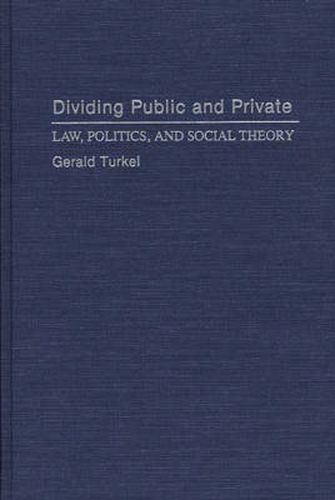Readings Newsletter
Become a Readings Member to make your shopping experience even easier.
Sign in or sign up for free!
You’re not far away from qualifying for FREE standard shipping within Australia
You’ve qualified for FREE standard shipping within Australia
The cart is loading…






The distinction between private and public realms of experience, of social activity, and of personal identity are fundamental for shaping everyday understanding and organisation of social life, yet the distinction has not been paramount in sociological theorising. Dividing Public and Private makes the public/private division central to social theory and social inquiry. Author Gerald Turkel demonstrates that by placing the public/private distinction at the center of social thought and by rethinking the writings of such classical theorists as Marx, Durkheim, Weber, and Parsons through the prism of the public/private dichotomy, new dimensions are raised for the analysis of authority, legitimacy, law, political participation, and the very meanings of freedom and necessity. Based on the joining of legal, social, and political theory, Turkel argues that the public/private division is crucial for mediating and overcoming social totalism and privatised oppression.
Dividing Public and Private challenges such theoretical approaches as critical theory, feminism, neo-Marxism, and liberalism to affirm the public/private division in directions that support equality, active participation in politics and the formation of collective projects, and individual self-determination. It aims to be suitable for theorists in law, political science and sociology.
$9.00 standard shipping within Australia
FREE standard shipping within Australia for orders over $100.00
Express & International shipping calculated at checkout
The distinction between private and public realms of experience, of social activity, and of personal identity are fundamental for shaping everyday understanding and organisation of social life, yet the distinction has not been paramount in sociological theorising. Dividing Public and Private makes the public/private division central to social theory and social inquiry. Author Gerald Turkel demonstrates that by placing the public/private distinction at the center of social thought and by rethinking the writings of such classical theorists as Marx, Durkheim, Weber, and Parsons through the prism of the public/private dichotomy, new dimensions are raised for the analysis of authority, legitimacy, law, political participation, and the very meanings of freedom and necessity. Based on the joining of legal, social, and political theory, Turkel argues that the public/private division is crucial for mediating and overcoming social totalism and privatised oppression.
Dividing Public and Private challenges such theoretical approaches as critical theory, feminism, neo-Marxism, and liberalism to affirm the public/private division in directions that support equality, active participation in politics and the formation of collective projects, and individual self-determination. It aims to be suitable for theorists in law, political science and sociology.